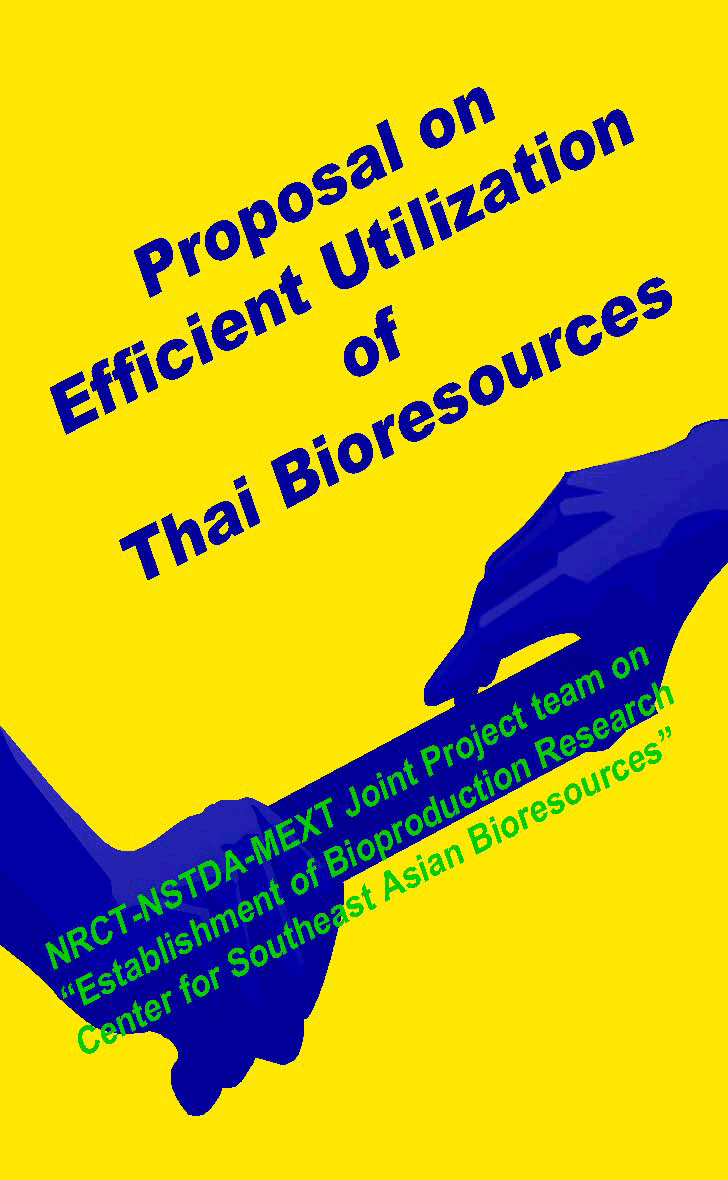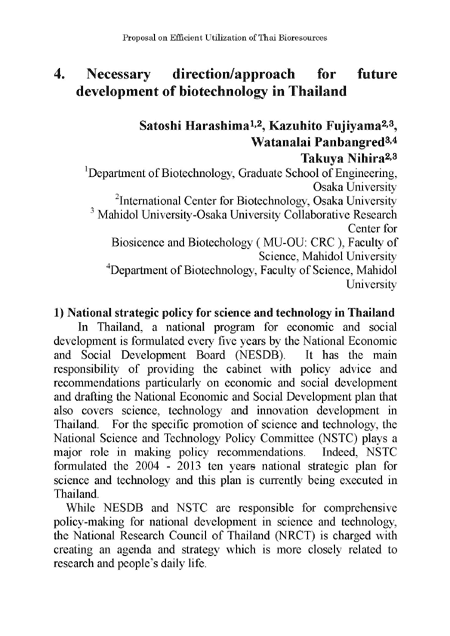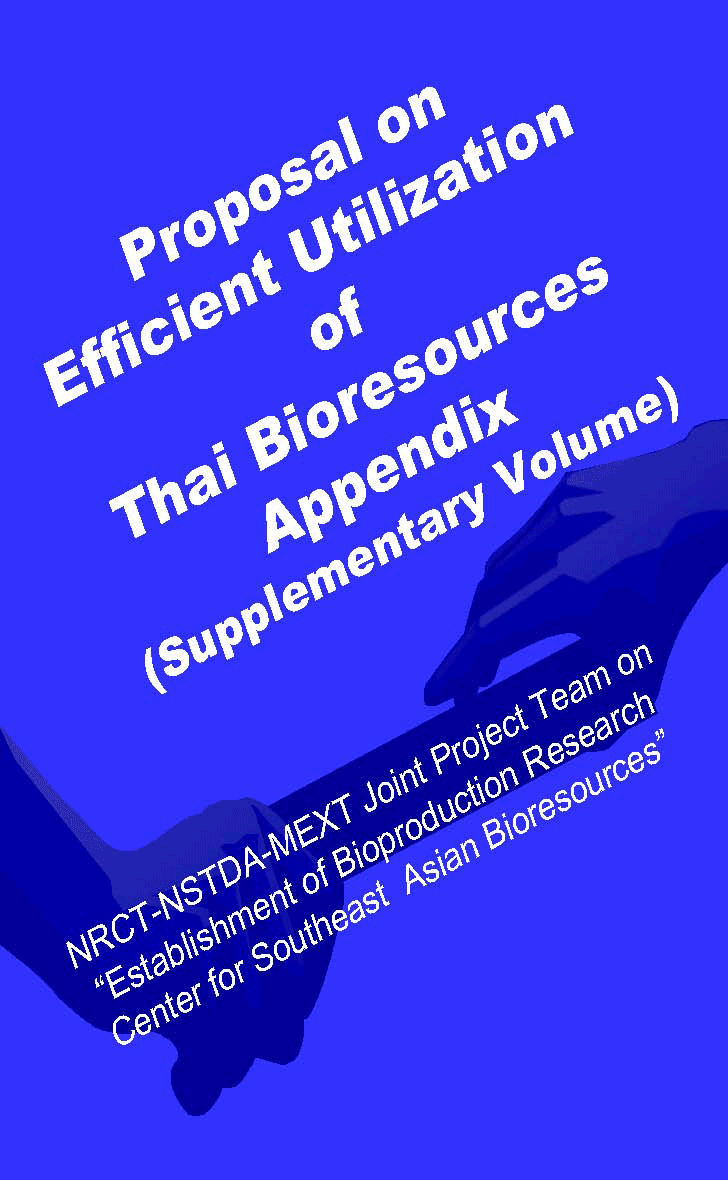
Wellcome!
JSPS Asian CORE Program :
This project aims to develop next-genereation bioproduction platform by interaction between excellent researchers from Japan, Thailand, Viet Nam, Laos and Cambodia, together with fostering young researchers from theose countries for future in the field of industrial biotechnology. (Leader:T.Nihira ICB,Osaka University)
About This Project
Japanese Core Organization: Osaka University
Japanese Coordinator: Prof.Takuya Nihira, International Center for Biotechnology
Research Exchange Title: Next-Generation bioproduction platform leveraging subtropical microbial bioresoruces
counterpart Country and Core Organization: Thailand: Mahidol University
Viet Nam : Viet Nam National University Hanoi
Conceptual diagram for network formation
Research Exchange Purpose
Based on the result from preceding
MEXT/JSTproject carried out in FY2006-2008, in this project, area is expanded widely to Thai neighbouring countries( Viet Nam, Laos and Cambodia) in addition to Thailand, and research exchange will be carried out focusing on development of bioproduction platform using microbes.Thailand, Viet Nam, Laos and Cambodia belong to countries baving subtropical climate, and thus have abundant bioresources, such as agro/marine resources. Especially, maicrobial resources as invisible bioresources are highly abundant, possessing diverse array of unexplored microorganisms which are not present in Japan. These microorganisms should be regarded as having high potential to be producers of novel useful bioactive compounds (such as antibiotics and bacteriocins), producers of useful industrial enzymes( phytase of soft biomass degrading enzyes), whole-cell catalyst to produce bioethanol or sugars through degradation of soft biomass or the biocatalyst rplacing present toxic inorganic catalyst in industrial processes in converting hydrophobic compounds. On-site bioproduction platform using Southeaset Asian bioresources is essential as the next-generation fundamentl technology. this project aims to develop next-genereation bioproduction platform by interaction between excellent researchers from Japan, Thailand, Viet Nam, Laos and Cambodia, together with forstering young researchers from those countries for future in the field of industrial biotechnology.



Outline of Research Exchange
Japanese academic consortium will be formed from professional academic staffs belonging to top five Japanese universities (Osaka U., U. Tokyo, Hokkaido U., Kyushu U. and Toyama Prefectural U.) who are excellent in several steps of industrial biotechnology. Similarly, Thai academic consortium will be formed from representative young researchers in the field of biotechnology from Thai top 4 universities (Mahidol U., Chulalongkorn U., Kasetsert U., and KMUTT)and BIOTEC(National Center for Genetic Engineering and Biotechnology). The international collaboration will be performed between the Japanese consortium and the Thai consortium to design and establish efficient way in the utilization of bioresources.
Social and economical effects
In Southeast Asian countries, it is the common problem that the abundant bioresources mainly resulted in the production of primary raw materials, such as rice or sugar, but do not lead to the production of more value-added products. Implementation of bioproduction research center which aims to promote the production of more value-added bioproducts is highly beneficial for the society and the economy of Southeast Asian countries.
Ripple effects from the project towards other projects
This proposal is the first in the field of biotechnology which aims to design and implement the total processes of research and development into the industrial-scale production of bioproducts from unexplored bioresources of Southeast Asian countries.
Information of research partner
The counter part universities (Mahidol U., Chulalongkorn U., Kasetsert U. and King Mongkut's University Thonburi) are the top 4 universities of Thailand, and have sufficient capacity in human resources and scientific equipments.
Past achievements
International Center for Biotechnology, Osaka University, has been operating international exchange program for the past 27 years with Thailand under the frame of Core University Program of Japan Society for the Promotion of Science (JSPS) as the core university in Japan since 1978. With the 4 universities of Thailand participating in this proposal, International Center for Biotechnology has vast amount of achievements and records of collaboration. In addition, International Center for Biotechnology has been operating for the past 32 years the UNESCO Postgraduate University Course, from which 75 Thai researchers have graduated and actively engaged in Thailand in education and research. With those graduated from the UNESCO course and those participated in the JSPS program, very tight and friendly human network of researchers in the field of biotechnology has been created and maintained.
*This program is supported by JSPS.
Copyright 2009 @The ICB, Osaka University T.Nihira




